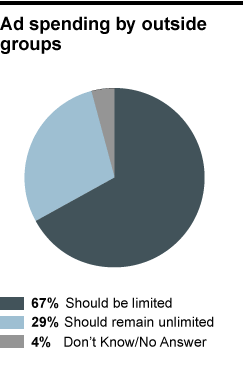Poll: Most want limits on campaign spending
CBS News Poll analysis by the CBS News Polling Unit: Sarah Dutton, Jennifer De Pinto, Fred Backus and Anthony Salvanto.
A majority of Americans favor limits on both how much money individuals can contribute to political campaigns and on how much outside groups can spend on advertisements designed to influence an election, according to a new CBS News/New York Times survey.
Sixty-four percent said the government should limit individual contributions to campaigns, while 31 percent favored allowing individuals to make unlimited campaign contributions. Majorities of Republicans, Democrats and indipendents all favored limiting contributions.
Individuals are currently allowed to give $2,500 to each candidate or candidate committee during an election cycle, and $30,800 to a national party committee each election year.
In this election cycle, super PACs backing various presidential candidates - though not officially affiliated with them - have already spent millions on ads to prop up or tear down a candidate. In the CBS News/New York Times survey, Americans were told that groups that are technically unaffiliated with candidates can spend unlimited money on advertisements during a presidential campaign, and asked if such spending should be limited by law.
Sixty-seven percent of respondents - including clear majorities of Republicans, Democrats and independents - said yes. Only 29 percent favored the unlimited spending on advertising from outside groups now permitted by law.
MORE FROM THE POLL:Poll: Obama ties Romney in head-to-head match upPoll: 4 in 10 say gov't should pay more attention to minority issuesPoll: More see signs of life in economyPoll: Obama's approval rating stable; Americans want compromisePoll: Mitt Romney atop fluid GOP race with 28%
Read the full poll (PDF):
Race relations and the role of the federal government
The economy, the president and the general election
The Republican race for the nomination
This poll was conducted by telephone from January 12-17, 2012 among 1,154 adults nationwide.
1,021 interviews were conducted with registered voters and 340 with voters who said they plan to vote in a Republican primary. Phone numbers were dialed from samples of both standard land-line and cell phones. The error due to sampling for results based on the entire sample could be plus or minus three percentage points. The margin of error for the sample of registered voters could be plus or minus three points and five points for the sample of Republican primary voters. The error for subgroups may be higher. This poll release conforms to the Standards of Disclosure of the National Council on Public Polls.
